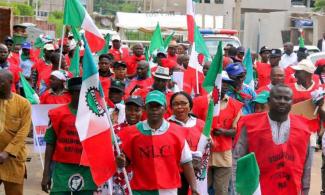
Delivering the ruling, Justice Kado Sanusi had granted an ex-parte motion restraining the NLC, ULC and TUC from proceeding with the industrial action until the determination of the substantive suit filed by the Federal Government and the Attorney general of the Federation (AGF). However, on Monday, Justice Kado said it would be unnecessary to grant another order stopping labour from embarking on the planned strike, having granted one on Friday.

The National Industrial Court of Nigeria in Abuja on Monday rejected a request for a fresh order stopping the organised labour from embarking on its planned indefinite nationwide strike, set to begin Tuesday.
On Friday, the NIC had restrained the Nigerian Labour Congress (NLC), the Trade Union Congress (TUC) and the United Labour Congress from proceeding with strike.
Delivering the ruling, Justice Kado Sanusi had granted an ex-parte motion restraining the NLC, ULC and TUC from proceeding with the industrial action until the determination of the substantive suit filed by the Federal Government and the Attorney general of the Federation (AGF).
However, on Monday, Justice Kado said it would be unnecessary to grant another order stopping labour from embarking on the planned strike, having granted one on Friday.
He also refused to grant the prayer for an order to compel the government to immediately commence the process of adopting N30,000 as the new national minimum wage.
FG filed the original suit after organised labour threatened to embark on strike if the national minimum wage is not raised from N18,000 to N30,000.
However, a civil society group, Kingdom Human Rights Foundation International, filed a fresh ex-parte application seeking to stop labour from embarking on the strike and to also compel government to commence the process of paying the N30,000 minimum wage.
On both demands, the group lost, as Justice Kado said an order of interim injunction could only be granted if there was an urgency, and if there was the need to preserve the subject matter of the dispute and the defendants could not be served.
He concluded since the court granted an order stopping the strike, on Friday, there was no longer any form of urgency in the matter, meaning it was not necessary to compel the government to start the process of adopting the N30,000 as the new national minimum wage or to issue another order preventing labour from embarking on strike.